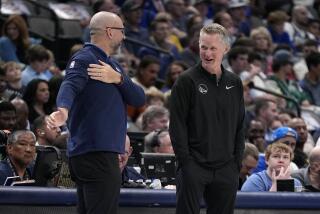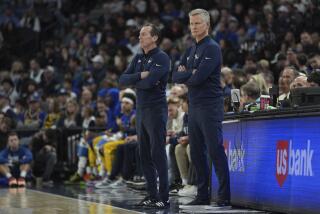WESTPHAL RISES : There’s Heir of Change on Phoenix’s Coaching Horizon
- Share via
PHOENIX — The scenario becomes more remote with each Phoenix Sun loss in the Western Conference finals, but some optimists in the Southwest have suggested that this is the way the club’s uncertain coaching situation will be resolved:
Shocking the National Basketball Assn. establishment, the Suns complete a dizzying turnaround by winning the league’s championship. Thus culminating a 16-season coaching career on top, Cotton Fitzsimmons victoriously walks off into one of those Technicolor desert sunsets, and Paul Westphal becomes his successor.
That might be pushing it to an extreme, especially because the Suns are two games down to the Lakers going into Game 3 Friday night. And to Westphal, who has been assured the job when Fitzsimmons, 57, eventually retires, that might turn out to be the worst-case scenario. “There’s been a lot of talk that (Fitzsimmons) was hinting that, if we won it all, he’d go out a winner and turn it over to me then,” Westphal said, shaking his head. “I said to him, ‘Over my dead body. You aren’t going to leave me to handle those types of expectations.’ The longer Cotton stays, the longer it is before I get fired (as head coach).”
Self-deprecation aside, Westphal nonetheless does not seem too concerned with when he moves from assistant to replace Fitzsimmons, a strong coach-of-the-year candidate.
Westphal, who grew up in Redondo Beach and played at USC, is secure in the knowledge that, some day, the job he covets will be his. Fitzsimmons made it clear from the start of the season that he would serve as a caretaker before eventually moving full-time to a front-office position and putting Westphal in charge on the court.
Those plans were made before the surprising Suns went from lottery participants to conference finalists. But Fitzsimmons says the offer still stands.
“I honestly hope he doesn’t go right away,” Westphal said. “I’m perfectly content to stay (as an assistant) as long as he enjoys coaching. We’ve had an understanding from the start, and I can wait as long as it takes.”
He may not be an NBA head coach yet, but Westphal’s rise has been so swift and somewhat surprising that perhaps remaining in this holding pattern will enable him to find perspective. Three years ago, the former star guard with the Boston Celtics and Suns was the volunteer coach at Southwestern Baptist Bible College in Phoenix. The enrollment was 250. Home games were played at a nearby junior high school. The team’s fans mostly were family members. The coach was almost as tall as his tallest player.
In 1985-86, Westphal’s team won 21 games and advanced to the National Little College Assn. tournament. That brought Westphal some national attention, and he landed the coaching position at Grand Canyon College, which won the NAIA championship last season.
Bypassing Arizona’s major universities altogether, Westphal moved closer to his coaching goal when Fitzsimmons hired him as his chief assistant coach. He let people know that, in a season or two, the clipboard would be ceremoniously passed and Westphal would take over.
It was not, Fitzsimmons says now, that Westphal needed time as an assistant to reacquaint himself with the NBA. It was just that Fitzsimmons wanted to guide the Suns through what figured to be a rough rebuilding process.
“He’s ready,” Fitzsimmons said of Westphal. “Heck, he was ready before this season.”
Although he has only three seasons of small-college coaching on his resume, Westphal, 38, defends his record. He points to 11 seasons of experience playing in the NBA under such diverse coaching styles as Hubie Brown, Tom Heinsohn and John MacLeod.
“(College coaching) was good experience,” Westphal said. “But basketball is not an exact science or anything. For a long while, a few college coaches wanted people to believe that you had to have that vast college background to be a good NBA coach.
“But guys like Pat Riley, K.C. Jones, Don Nelson and other guys have proven that’s not true. There are no set requirements.”
Westphal did learn a bit about handling players and diagramming plays during his college coaching tenure and this season with the Suns.
“I think that helped him,” Fitzsimmons said of Westphal’s time in college coaching. “Experience is a great teacher. If you’ve been through it, having the total responsibility, it helps prepare you for the next time.
“But Paul has always had a feel for the game, when he was a player. He thinks ahead. He’s imaginative. He’s like Columbus--he’ll take chances on new ideas.”
Westphal’s duties, however, are not much different than those of any other NBA assistant. He does most of his hands-on work in practice, and remains rooted to the bench while the coach nervously paces the sideline during games.
He says he has learned from Fitzsimmons, who employes a fast-break style that Westphal favored as a player. Though lacking Fitzsimmons’ fiery personality, Westphal also said he admires the way Fitzsimmons handles himself.
But, of all the coaches with whom Westphal has been associated, he says he learned the most from Ken Brown, his coach at the now-closed Aviation High School in Redondo Beach.
e “I’ll use a little bit of all I’ve learned when I coach,” he said.
When is the big question in Phoenix. Speculation is that Fitzsimmons will return as coach next season, probably his last. But Fitzsimmons said nothing has been decided.
“There’s no timetable, one way or the other,” Fitzsimmons said. “I’m going to do what’s best for the franchise. What will happen is that Jerry Colangelo (club president), Paul Westphal and Cotton Fitzsimmons will sit down eventually and we’ll all decide when it’s time.”
The last time Westphal met with upper management, it was not under such pleasant circumstances.
It was in 1984, shortly after Westphal was cut by the Suns. He had signed a two-year contract, guaranteed only if he played in at least 60 games per season. Westphal played in 59 games in 1983-84, then was waived before the start of the next season and did not receive his guaranteed salary.
Westphal took the matter to arbitration, saying he was healthy enough to play in the 60th game, but that the Suns purposely held him out so that the club would save money. He lost twice in arbitration.
Now, in a turnaround almost as startling as the Suns on the court, Westphal is part of management.
“Five years ago, in fact, one person suggested to me that I’d be coaching the Suns one day,” said Westphal, smiling at the irony. “I told her, that would pretty much be a miracle with all that’s happened.
“But things change, you know.”
More to Read
Go beyond the scoreboard
Get the latest on L.A.'s teams in the daily Sports Report newsletter.
You may occasionally receive promotional content from the Los Angeles Times.









